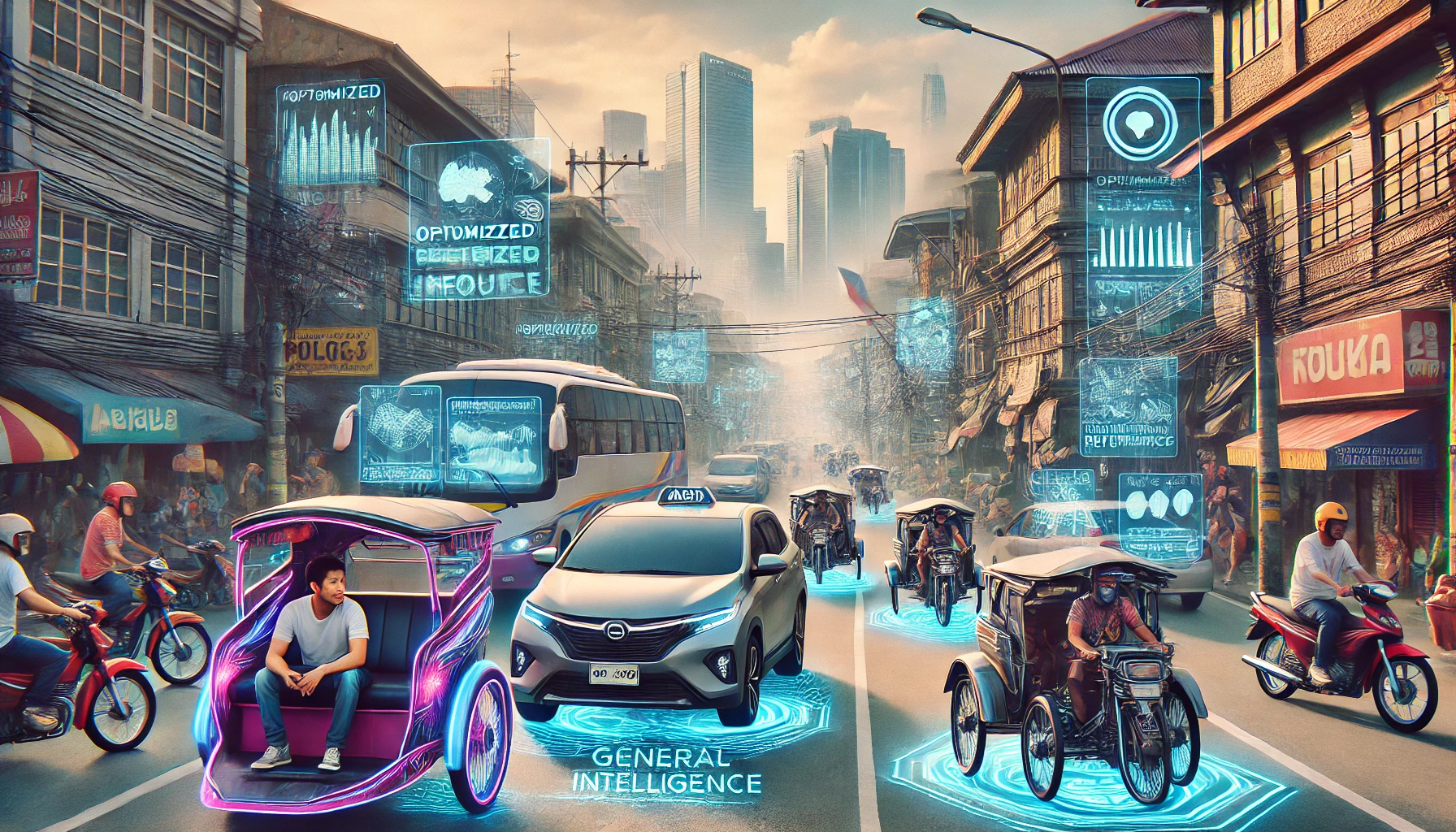The advent of Artificial General Intelligence (AGI) presents transformative opportunities for industries worldwide, including the ride-hailing and tricycle operations sector in the Philippines. These operations, integral to the country’s transportation landscape, can leverage AGI to enhance efficiency, profitability, and customer satisfaction. Here’s how AGI can revolutionize this space.
1. Dynamic Route Optimization
One of the biggest challenges for ride-hailing and tricycle operators in the Philippines is navigating congested urban areas. AGI systems, capable of understanding and analyzing complex traffic patterns in real time, can provide dynamic route optimization. This can:
- Reduce travel time.
- Save fuel costs.
- Enhance customer satisfaction by minimizing delays.
2. Demand Prediction and Surge Pricing
AGI’s predictive analytics capabilities can analyze historical data, weather patterns, local events, and real-time conditions to forecast demand spikes. This allows operators to:
- Implement surge pricing effectively.
- Allocate resources (e.g., drivers and tricycles) more efficiently during peak hours.
- Maximize profitability during high-demand periods.
3. Maintenance and Vehicle Health Monitoring
Frequent breakdowns can result in lost revenue and dissatisfied customers. AGI-powered predictive maintenance systems can:
- Monitor tricycles and ride-hailing vehicles for potential issues.
- Alert operators to service needs before failures occur.
- Optimize maintenance schedules to reduce downtime.
4. Enhanced Safety and Driver Monitoring
AGI systems can improve safety by monitoring driver behavior through in-vehicle cameras and sensors. Features include:
- Real-time alerts for unsafe driving practices.
- Driver fatigue detection and intervention.
- Accident analysis to improve future safety measures.
5. Streamlined Payment and Customer Experience
AGI can integrate seamlessly with payment platforms, making transactions faster and more secure. Additionally:
- Personalized ride experiences can be created using AGI-driven insights.
- AI-powered chatbots can handle customer inquiries, complaints, and bookings 24/7.
- Enhanced customer feedback analysis can improve services.
6. Fleet Management for Tricycle Cooperatives
Many tricycle operators function under cooperatives or associations. AGI can assist in:
- Allocating trips fairly among members.
- Optimizing earnings distribution.
- Managing finances and cooperative resources more transparently.
7. Scaling Electrification and Sustainability
With the global push toward sustainable transport, AGI can guide the shift to electric vehicles (EVs) for tricycle and ride-hailing operators. AGI can:
- Predict cost savings from transitioning to EVs.
- Optimize charging schedules and locations.
- Provide insights into government incentives and compliance with environmental regulations.
8. Fraud Detection and Prevention
Fraudulent activities such as fake bookings and fare evasion can impact profitability. AGI can:
- Detect anomalies in booking patterns.
- Verify passenger identities securely.
- Identify and prevent suspicious activities proactively.
9. Market Expansion and Strategic Decision-Making
AGI can support operators in identifying underserved areas and optimizing fleet placement. Strategic insights include:
- Identifying profitable routes and areas with high demand.
- Advising on pricing strategies tailored to local socio-economic conditions.
- Supporting data-driven decisions to expand operations sustainably.
Challenges to Adoption
While AGI holds immense potential, challenges must be addressed for successful implementation:
- Cost: Initial investments in AGI infrastructure can be high.
- Training: Operators and drivers need to be trained to use AGI-powered tools effectively.
- Regulation: Clear policies on AI integration in public transport are necessary to avoid conflicts and ensure ethical use.
Conclusion
Integrating Artificial General Intelligence into ride-hailing and tricycle operations in the Philippines is a game-changer. By embracing AGI, operators can unlock higher profitability, improved service quality, and sustainable growth. The transformation requires collaborative efforts between operators, technology providers, and policymakers to ensure a seamless transition into the future of intelligent transportation. With AGI, the future of Philippine transportation shines bright.
[SEO optimized]


